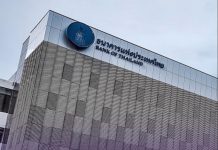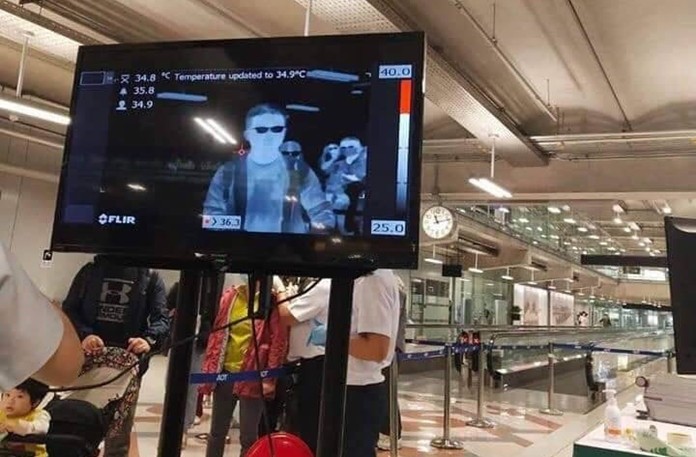
(MOPH) Officially Published by the Office of International Cooperation, Department of Disease Control (DDC) Thailand Issued on 11 March 2020 at 5.50 P.M.
Q&A Regarding the Measures for Travelers
Q:Will all travelers who present with a fever and respiratory symptoms be transported to a medical facility, regardless of the country from which they are arriving?
A:If a traveler presents fever and respiratory symptoms with one of the following risks within 14 days prior to illness onset: 1) Arrived from or resided in an affected area with from COVID-19 (the list of countries as affected areas is announced on the website of the Department of Disease Control (DDC)), 2) Are residents of the same household with travelers from areas where COVID-19 outbreaks were reported,3) Worked closely with tourists from areas with ongoing outbreaks of COVID-19,4) Had close contact with probable or confirmed cases of COVID-19,and 5) Healthcare workers who had contact with people who met the case definition for patients under investigation (PUIs) of COVID-19, then they will be transported to a medical facility. The risks include both factors of travel history from the affected countries and contact history.f a traveler is suspected for PUI, then public health officers will follow the strict guidelines of the law to bring travelers that fall under the criteria to a medical facility specified by the MOPH so that the aforementioned traveler can be tested, treated, clinically diagnosed, isolated, or quarantined on a case by case basis.
Q:What is a suspected case of COVID-19? A COVID-19 patient or confirmed case?
A:We refer to the suspected cases of COVID-19 as patients under investigation (PUI). If a traveler exhibits the following traits, then they will be considered a PUI as follows;1)Patients have signs and symptoms as follows:documented body temperature >37.5 °C accompanied by any of the following respiratory symptoms: cough, runny nose, sore throat, shortness of breath or difficulty breathing. With one of the following exposure risks within 14 days prior to illness onset:1) Arrived from or resided in an area with ongoing outbreaks of COVID-192) Are residents of the same household who traveled from areas where COVID-19 outbreaks were reported.3) Worked closely with tourists from areas with ongoing outbreaks of COVID-194) Had close contact with probable or confirmed cases of COVID-195) Healthcare workers who had contact with people who met the case definition for patients under investigation (PUIs) of COVID-19.Confirmed COVID-19 casesare defined as a PUI who has tested positive for genetic material of SARS-CoV-2 by PCR from two reference laboratories, or by genetic sequencing, or by culture.
Q:What is the reporting system referred to and how will it be made available to travelers?
A:The Thai Ministry of Public Health is developing the reporting health system in cooperation with the Faculty of Public Health at Chiang Mai University. Travelers can download the reporting system application by scanning a QR code. A workshop to train quarantine officers was held recently; this reporting system is on its way to being implemented soon.
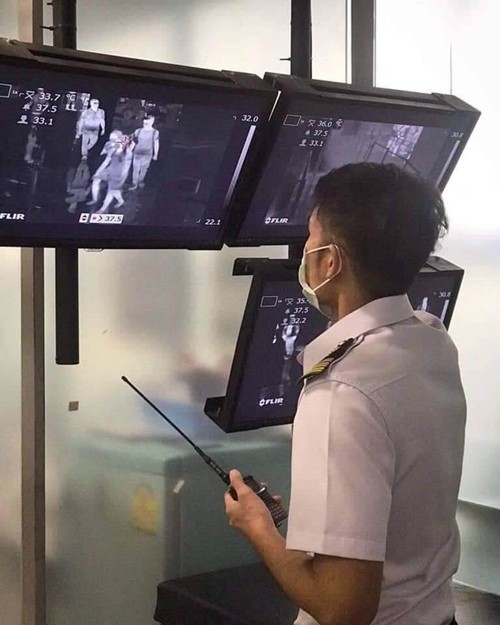 Q:If under instructions to self-quarantine, how will the surveillance officer monitor travelers?
Q:If under instructions to self-quarantine, how will the surveillance officer monitor travelers?
A:The surveillance officer will use the contact information from the forms that the travelers fill out upon arrival in Thailand. The surveillance officers on-duty can access data of the travelers from the reporting system as well.
Q:Will the surveillance officer contact the traveler, or must the traveler accept responsibility to contact health authorities?
A:Communication between the travelers and the surveillance officers is interactive. The travelers have to report their symptoms every day, for 14 days. If the traveler exhibits disease symptoms, or if communication is lost, then the surveillance officers will track the traveler, place them back into the system, and follow-up for surveillance, clinical diagnosis, and treatment for prevention and control as determined in the guidelines.
Q:What are, if any, the measures that will be applied to family members of travelers coming from Disease Infected Zones or from Ongoing Local Transmission Areas? Are family members of travelers subject to any restriction of movement or activity, including work or school?
A:Family members of travelers from Ongoing Local Transmission Area sand Disease Infected Zone,are requested to self-monitor their symptoms because they are in close contact with them. Depending on the guidelines and rules administered by public health officials and immigration officers to the traveler who has entered Thailand, the traveler must either self-monitor or self-quarantine at their accommodations. Practical guidelines for household members and disinfection in the household● All household members should wash hands with water and soap for at least 20 seconds as frequently as possible in order to reduce the risk of infection and spreading the diseases. In case there is no water and soap, clean hands with alcohol-based hand sanitizer gel that contains at least 70% alcohol concentration.● Keep monitoring symptoms for developing illness among close contacts of those travelers and other household members for 14 days.● The travelers should sleep in a separate bedroom.If it is unavoidable to share a dining table, always use serving spoons.● Do not share personal belongings with those travelers, such as handkerchiefs, drinking glasses and straws.● Avoid being in close contact by keeping 1-2 meters away from others. ● When the quarantined individual departs, clean the quarantine area and surfaces such as beds, tables, any utensils in the area and restroom using 5% bleach sodium hypochlorite (proportion: 1 part bleach and 99 parts water).● Clean clothes, bed sheets, towels, etc. with soap or regular detergent and water. Or wash them with hot water at 60-90 degrees Celsius.Family members who experience onset of 1 or more respiratory symptoms (cough, runny nose, sore throat, and shortness of breath), and/or a fever greater than or equal to 37.5 degrees Celsius, must inform a disease control officer immediately in order to be tested, clinically diagnosed, and treated in a timely manner, allowing officers to also isolate or quarantine as necessary to prevent transmission.
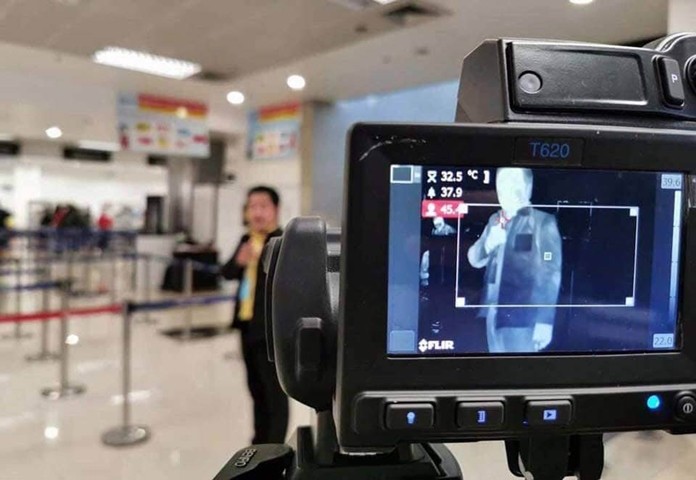 Q:Who does this announcement apply to (i.e.diplomats, Thai people, non-Thai, business, travelers, NGO workers etc.)?
Q:Who does this announcement apply to (i.e.diplomats, Thai people, non-Thai, business, travelers, NGO workers etc.)?
A:This announcement applies to all travelers departing from Disease Infected Zones or countries with Ongoing Local Transmission of COVID-19 announced by the Kingdom of Thailand.
Q:What is the process for travelers who spent time in-transit in a Disease Infected Zone while on their way to Thailand? If travelers depart from a country that is not considered a Disease Infected Zone, but transit at an airport in a Disease Infected Zone will they be under the same protocol as a traveler coming from a Disease Infected Zone?
A:All passengers who transited for at least 12 hours at an airport in a Disease Infected Zoneor who passed through immigration in a Disease Infected Zone, must pass the entry screening including a thermal scan, fill the T8 form, and provide the necessary information to the officers at the Quarantine Office upon arrival to Thailand. Before boarding, the passengers will have their body temperatures rechecked and need to pass the exit screening prepared by the airlines. During the period of transit, we request the cooperation from the passengers to implement social distancing and only stay in the area near the gate
Q:What are Disease Infected Zones and Ongoing Local Transmission Areas? How are these defined?
A:See the page for the most updated information: https://ddc.moph.go.th/viralpneumonia/eng/index.php-A Disease Infected Zone is defined as a country or special administrative region reporting over 1,000 confirmed cases and the ongoing local transmission cases consecutively for 14 days-Ongoing local transmission is defined as a country or special administrative region reporting cases for two consecutive weeks
 Q:Is there official documentation or certification for the travelers from Disease Infected Zones to confirm that 14 days of quarantine has been completed?
Q:Is there official documentation or certification for the travelers from Disease Infected Zones to confirm that 14 days of quarantine has been completed?
A:As of now, we plan to bring this issue for further discussion with the EOC, MoPH
Q:Can travelers from Disease Infected Zones under mandatory self-quarantine leave Thailand or return to their homes in Disease Infected Zones before the 14-day duration is complete?
A:Yes, but those who would like to leave Thailand or return to their homes, must receive permission from the communicable disease control officer, and must not have symptoms in order to pass exit screening.
Q:Do they need permission to go to the airport? Will they be punished if they decide to go to the airport without contacting an officer?
A:The traveler should be requested to show the permission form which states that they have received approval from the communicable disease control officer/health authorities/Thai authorities and show to officers/authorities at the airport before leaving Thailand or return to their home. And the traveler must pass exit screening procedures. Those who want to leave Thailand or return to their home but did not ask for permission from the disease control officer, shallbe punished according to Communicable Diseases Act, B.E. 2558 (2015)if they attempt to depart.
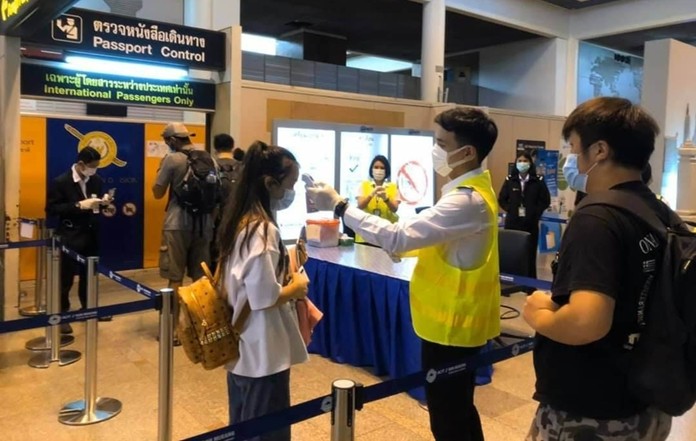 Q:What is the process to enforce the Communicable Disease Act for offenders? What is the penalty for those who do not abide by the MOPH regulations?
Q:What is the process to enforce the Communicable Disease Act for offenders? What is the penalty for those who do not abide by the MOPH regulations?
A:After the official announcement, if travelers do not comply with the law, they will face penalty under the law. The offender will be fined up to 100,000 Thai Baht or imprisoned up to one year in jail or both of those penalties.
Q:For healthy passengers from Disease Infected Zones, how will they be transported to their accommodations for mandatory self-quarantine?
A:They are responsible for arranging transportation on their own. During transit to the accommodations, please wear a mask.
Q:Are travelers from Disease Infected Zones allowed to change hotels during their mandatory 14-day self-quarantine? What if they already made reservations for multiple hotels?
A:In the case where passengers would like to change the hotel or residence, they need to ask the permission from the disease control officer. Thus, they have to provide all reservations of the accommodations at the immigration office by filling in T8 form for the benefit of both (travelers and officers)
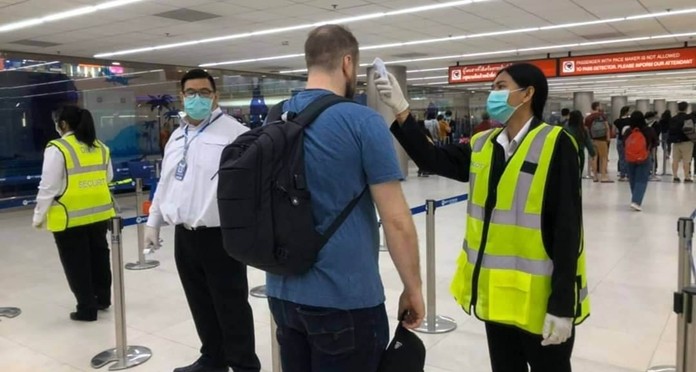 Q:Are families allowed to stay together in the same room during mandatory 14-day self-quarantine?
Q:Are families allowed to stay together in the same room during mandatory 14-day self-quarantine?
A:Yes. But please strictly follow the advice for people and family members who arrive from the affected areas as shown in the DDC website. If the family members develop symptoms, they must go to the hospital and follow the procedures
Q:Are travelers from Disease Infected Zones who are under the mandatory 14-day quarantine allowed to use the facilities at hotels (swimming pools, saunas, restaurants etc.)
A:We encourage them to avoid using the swimming pools and facilities that have gatherings of people.Currently, we do not have evidence about the spreading of the disease in swimming pools, but it can spread via droplets with people staying together beside the pools.For restaurants, it is fine to use private tables, but in public areas, people should separate their personal items, use serving spoons and clean hands before having meals.
Q:What if hotels or other services discriminate against people coming from Disease Infected Zones? Are hotels allowed to deny service to guests based on nationality or recent travel history?
A:Actually, we encourage all managers and operators of hotels or other services not to discriminate against the customer based on their nationality or recent travel history. However, the protocol or the actual practice depends on hotels’ rules and regulations.
Q:How does Thailand track people who lie about their accommodations/contact information on their T8 form and arrival card?
A:It is hard to confirm valid information on the T.8 form, it shows flight information, personal information, travel history, symptoms, and reserved accommodations. It means we can check with that information and will contact the hotel for more information. If travelers do not follow our laws and measures, we will use the penalty under the Communicable Diseases Act, B.E. 2558 (2015).
Glossary COVID-19:Coronavirus Disease 2019. There are many strains of coronaviruses. The pandemic we are experiencing is with a new (novel) strain that was discovered in 2019, hence the name: COVID-19.Disease Infected Zones (DIZ): See page for the most updated information: https://ddc.moph.go.th/viralpneumonia/eng/index.php (add info about the local transmission case)Ongoing Local Transmission Areas: See page for the most updated information: https://ddc.moph.go.th/viralpneumonia/eng/index.phpPenalty: If travelers do not comply with the law, they will be under the penalty of the law, meaning the offender will be fined up to 100,000 Thai Baht, or imprisoned up to one year in jail, or receive both of these penalties. Self-Monitoring: Body temperature screening twice a day, every day since arriving in Thailand, for a total of 14 days. If you have fever with respiratory symptoms, report to the local health authority. Self-Prevention: maintain good personal hygienei.e.wear a mask, wash hands frequently with soap or an alcohol-based hand sanitizer, avoid people who have symptoms, stay at home when feeling sick, clean and sterilize frequently-touched equipment and surfaces.Self-Quarantine:People have to quarantine themselves in areas (rooms in household, in the reserved hotel room) no less than 14 days until the end of the infectious period or the reason for suspicion. People are not allowed to go outside without permission from disease control officers(emergency case).Moreover, people must practice self-prevention measures. If a fever develops during the quarantine period, they are required to inform the disease control officers immediately.Social-Distancing: Separate yourself from other people by avoiding mass gathering events, avoiding crowded places or remaining out of congregated settings.If possible, limit interactions with others as much as possible for 14 days.
 |
 |
 |





